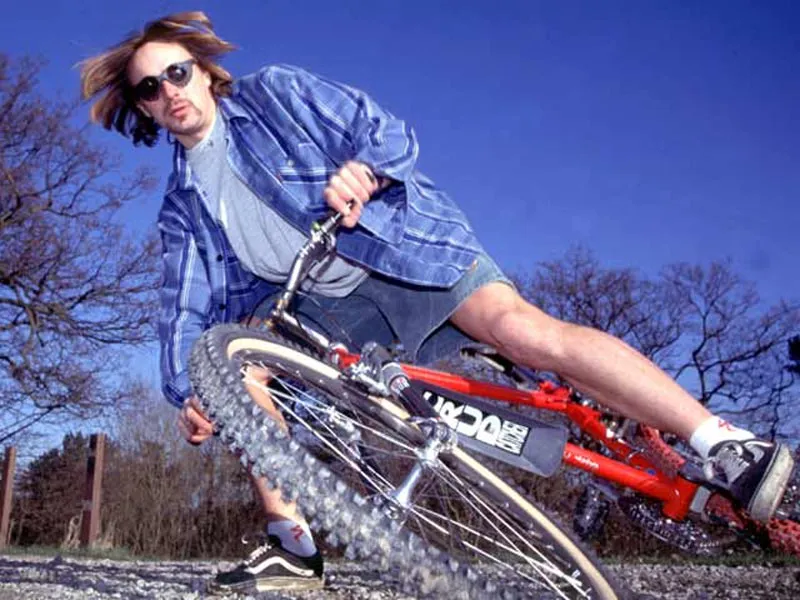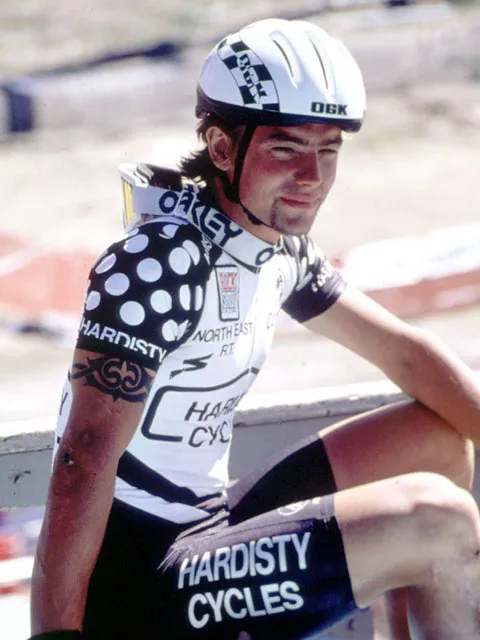Jason McRoy was the first true Superstar of British Mountain Biking, paving the way for his peers and those that would follow him. Tragically his life was cut short in 1995, when he was killed on his beloved Harley-Davidson on the Woodhead Pass in the Peak District, just before his riding career would arguably have reached its zenith.
Why was he the first true Superstar? Jason McRoy was a pioneer. He was one of the first Brits to take the risk, financially and competitively, to race abroad. At the famous Eliminator at Mammoth mountain, he came second against some of the best names in the world. They were backed by well financed professional teams, and he was a privateer who just about raised enough money from his winnings to go to the next race. Not surprisingly, it wasn’t long before he was signed up by Specialized, the first British pro rider to have a US team backed sponsorship.
McRoy had that rare ability to ride any bike well on top of that his will to win was legendary. At the World Championships in Bromont, Canada, his front tyre flatted stopping him in his tracks. Rather than give up, he ripped the tyre off and finished the race on the rim. Whilst out injured with a dislocated thumb he decided to have a go at keeping up his fitness at the Manchester Velodrome. So impressed was the England Coach Doug Daley, that he considered Jason as a possible track rider for the Atlanta Olympics.
His time as a racer was cut tragically short. But in that short span he won the British Points series twice, and was ranked 10th in the world, even when plagued with countless mechanical problems and injuries.
Finally, the thing that really marks him out as special, is that no one I have spoken to has a bad word to say about Jason. Everyone admired this super dedicated, super fast racer. Not only that, the racers recount stories where Jason encouraged them to succeed, even though they would be racing against him.
A true testament to the love felt for JMC, is the amount of mountain bikers that make yearly pilgrimages to his memorial site on the Woodhead Pass, who go there to remember the man that rode like the wind, often against all the odds. Wherever you are JMC, this is for you.
In the first of 2 interviews, I catch up with Jason’s father, Jim McRoy. We talked about his son’s life in racing, his personality and his legacy.
Bikeradar: Just how good a racer was Jason?
Jim McRoy: He had scarily powerful legs and needed a bike that could contain and direct that kind of power. I know which bike suited him best and it would only have been a matter of time before that bike was made available to him. Tactically, he was a great rider and loved to compete against others and not just against the clock.
How did he get started in racing?
As a youngster he watched indoor BMX racing at Crowtree Leisure Centre in Sunderland and decided he wanted to have a go. In his first race, on an admittedly cheap and nasty bike, he picked up a trophy riding against older kids. He was smitten from then on.
Can you tell us about his legendary determination to succeed?
Jason had a pretty tough life, health wise. Born quite weak with a hole in his heart, he totally ignored everybody’s advice on how to look after himself. At age seven he was pushing weights, and by the age of nine he was putting in the miles on my racing bike. He was a determined BMXer, I remember once at Leeds he had a crash that sliced off the top of his thumb – we took him to the local hospital where they stitched it back on again, then he insisted on going back to the track to race in the finals – and won.
A serious accident at age 11 when his knee ligaments were trashed in a BMX crash looked set to end his sporting career – doctors told him that his ligaments were so loose that he would have constant difficulty walking. He set about tightening the ligaments by pushing huge weights with his legs so that the leg muscles grew and pulled the ligaments back. He started running middle distance quite successfully, but missed the thrills and spills of two-wheeled racing. His chance to get back came at Rothbury when on his bog-standard Mountain Bike, he entered the NEMBA race and picked up third place. Since he was a newbie, nobody believed his time and it took some convincing for the officials to acknowledge that he had actually made the time clocked. He has raced with broken fingers, a broken wrist and all kinds of injuries that would make lesser people stay at home.
His epic battle against Yeti rider, Myles Rockwell at the Kamikaze Eliminator is oft referred to? What were Jason’s thoughts on the race?
It had been a bleak week; we got an invitation to the race after badgering Bill Cockroft, the organiser for a spot. This was on the back of the Vail downhill where Jason won his precious Tag watch for being the fastest man on the mountain. We were absolutely skint and spent the first night at Mammoth in the rented car! Jason tried out in the Kamikaze and didn’t do too well and wanted to practice more, but instead we took a trip to a nearby ghost town, Bodie. He wasn’t best pleased! Then the night before the Eliminator, we discovered that Jason’s bike had a cracked rear triangle. I went to the GT stand and got a used rear triangle from them and we spent most of the night fitting it to the bike - we had to borrow tools as well from the racers downstairs.
The next morning was cold and foggy and when we got to the top station we saw all of the other racers with their pro back-up, warm-up bikes, spare bikes, the full nine yards. We had a CoolTool and an inner tube. While most of the guys had full body armour – it was very much a contact sport – Jason had his lycra unitard. To overcome these hurdles and come second – by a couple of hundredths of a second - was an absolutely top achievement.
What, for him, was his most memorable race?
I think for Jason it had to be winning the Nationals right after coming back from coming second in the Eliminator. The stories from the California race had preceded him, and at the Nationals, everybody was rooting for him to win. He was so humbled, excited and relieved to have achieved the win and have the crowd on his side.
How did he feel when he became the first UK Downhiller to get a US backed team sponsorship (with Specialized)?
Stoked. He got a call from Ned Overend, the Specialized cross country legend, that started “I don’t know if you know who I am, but I’m Ned Overend from Specialized…”
A natural at BMX as well as Downhill, how good a 4X rider do you think he’d have been?
Even though he was the kindest person I knew, his competitive streak meant no compromise, no prisoners taken. He would have loved the concept and I’m sure he would have been among the top riders.
What do you think he’d make of modern downhill racing?
The sport has become more professional, the early days were very grass roots and the camaraderie was phenomenal. I think he would still love the sport, particularly the added-value elements of the race scene.
And, how fast do you think he’d be on today’s bikes?
If you saw how fast he went on bikes that had neither suspension nor efficient braking systems, you would just know that the technology would only make him go faster. Just look at Tomac – he can still rock them on the Kamikaze.
He was also a natural on the Velodrome, and considered for the 1996 Olympics. Was this a direction he was planning on going in before his untimely death in 1995?
If it had two wheels, went fast and involved competing, Jason was up for it. His early trials showed his power ratios well beyond many of the athletes competing at the Velodrome. If he set his mind to it he would have succeeded. He had great strength of mind and character.
His life and legacy carries on at your memorial website, how does it feel to still get so many great comments made even today, 12 years after his death, about Jason?
We are very proud that Jason made such an impact on the sport and that he is still an inspiration to others, not only mountain bikers, but ex-mountain bikers who have told us that Jason has inspired them to greater things in their lives outside of mountain biking. But, it is very hard for us sometimes to read them; even after 12 years we miss him dreadfully. Even completing this interview has taken some time because writing and talking about Jason makes me laugh and cry. He is dearly loved and is still a great chunk torn out of our lives.
Jason’s memorial at the Woodhead pass still gets a huge amount of visitors from mountain bikers the world over. What would Jason make of it?
The memorial is our ongoing tribute to Jason, it’s a 300-mile round trip for us, but we make five or six visits a year to clean up and improve the site. We hate going there because our route retraces Jason’s last journey and rekindles the memories of that awful day, but once the site is cleaned up we feel a sense of achievement and relief.
What would Jason think? He would be secretly proud, but also embarrassed by it all. I recall a time when he was in WH Smiths buying some mags (he was with Mum at the time ) and he was spotted by some MTB fans who had picked up the latest MBUK, and you know how some fans react – ‘Look, there’s Jason McRoy ask him to sign the mag’ ‘No, I daren’t.’ ‘Go On’. This went on for several minutes until his Mum told him to approach them. Very reluctantly and acutely embarrassed, he approached them and asked if they would like the mags signed, which he did and, after a chat, returned to choosing his own mags.
Jason would never refuse to chat with anyone on the circuit or sign autographs when he was ‘at work’ but away from the circuit he never really considered himself well known.
It was more important for Jason to be well-liked rather than well-known. His future was probably in the media; his TV takes were always one-shots and Daley Thompson told us that he was great to work with. (They did a pilot TV show that never aired about sporting personalities.)
What’s your most endearing memory of your son as a racer, and as a human being?
He was my mate, he was my hero. Jason was the kind of person who could and did bring sunshine to your life. He was always respectful and the kind of son any parent would be proud to have. He never, ever forget to call home on birthdays or special occasions and he was always thoughtful in whatever he did. The world is a poorer place for his passing.


